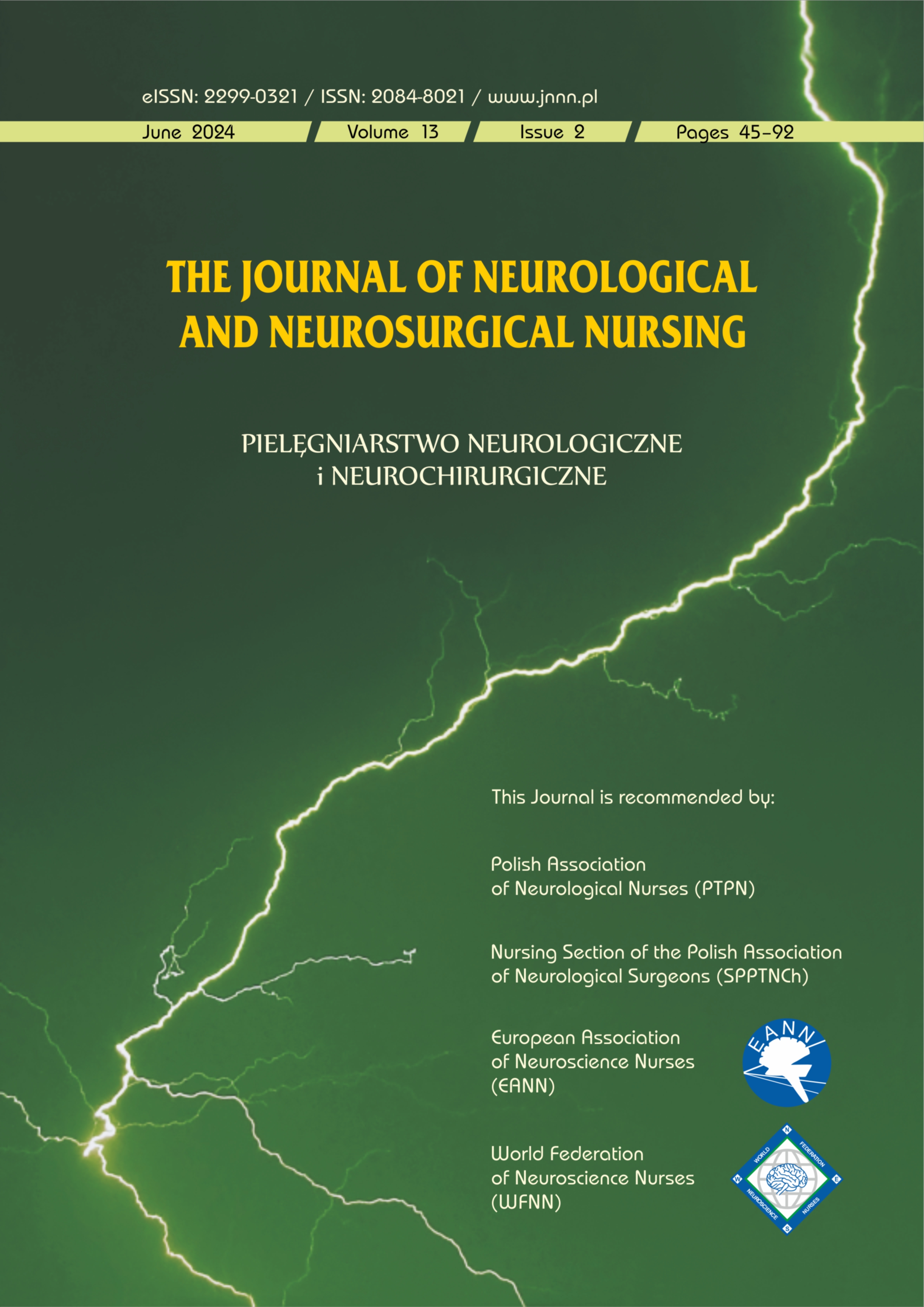Bezpieczne podejście do pacjentów w podeszłym wieku podczas zabiegu chirurgicznego – przegląd systematyczny
DOI:
https://doi.org/10.15225/PNN.2024.13.2.6Słowa kluczowe
powikłania, osoby starsze, bezpieczeństwo, chirurgiaAbstrakt
Rosnący odsetek ludności starszej to zjawisko o zasięgu światowym, które powoduje zmiany w epidemiologii pacjentów poddawanych zabiegom chirurgicznym, co skutkuje wzrostem liczby chorych pacjentów o osłabionej sprawności, którzy są bardziej podatni na potencjalne powikłania. Ocena przedoperacyjna musi być kompleksowa, aby skorygować odwracalne zaburzenia i zapobiec zdarzeniom niepożądanym. Opracowanie strategii i interwencji mających na celu zmniejszenie ryzyka i poprawę wyników pozwala pracownikom służby zdrowia na wprowadzenie praktyk opartych na dowodach w celu optymalizacji bezpieczeństwa pacjenta. Celem manuskryptu jest analiza bezpieczeństwa chorych pacjentów w podeszłym wieku w trakcie procesu perioperacyjnego oraz opisanie strategii zmniejszających ryzyko i poprawiających wyniki. Przegląd literatury został przeprowadzony w różnych bazach danych (PubMed, Scopus, SciELO, itp.). Kryteria wyboru obejmowały terminy takie jak „opieka perioperacyjna”, „osoby starsze w podeszłym wieku”, „chirurgia” i „powikłania pooperacyjne”. Wykorzystano operatory logiczne AND oraz OR. Według wszystkich przeanalizowanych badań pacjenci geriatryczni poddani operacji wymagają szczególnej opieki oraz kompleksowej oceny przedoperacyjnej ze względu na swoją podatność na ryzyko. Współpraca międzyzakładowa oraz opracowanie protokołów opartych na dowodach są kluczowe dla maksymalizacji bezpieczeństwa. Odpowiednie zarządzanie znieczuleniem, regulacja temperatury, optymalizacja bilansu płynów oraz dokładne monitorowanie parametrów życiowych, między innymi, są niezbędne dla zapewnienia bezpieczeństwa pacjentów. Pacjent starszy poddany operacji ma unikalne cechy, które wymagają specjalnych rozważań, aby zapewnić kompleksową opiekę dostosowaną do ich potrzeb, zmniejszając dodatkowe czynniki ryzyka. Ważne jest uwzględnienie ich kruchości oraz zdolności do regeneracji. (PNN 2024;13(2):85–89)
Bibliografia
de Oliveira D.F., Nakajima G.S., Byk J. Cirugía en pacientes ancianos: revisión sistemática de la literatura. Rev Bioét. 2019;27(2):304–312.
Thillainadesan J., Hilmer S.N., Fleury A.M., Naganathan V. New horizons in the perioperative care of older adults. Age Ageing. 2022;51(2):afab245.
Turchi M.J., López P.V., Crivelli F.J. et al. Cirugía ambulatoria de la hernia inguinal en pacientes ancianos. Estudio comparativo entre mayores y menores de 80 años. Rev Argent Cir. 2020;112(3):293–302.
Grifasi C., Calogero A., Esposito A., Dodaro C. Perioperative care of elderly outpatients. A review. Ann Ital Chir. 2015;86(2):100–105.
Herrera-Landero A., d’Hyver de las Deses C. Valoración preoperatoria del adulto mayor. Rev Fac Med. 2018;61(4):43–55.
Partridge J.S.L., Ryan J., Dhesi J.K., The CPOC-BGS perioperative frailty guideline group. New guidelines for the perioperative care of people living with frailty undergoing elective and emergency surgery — a commentary. Age Ageing. 2022;51(11):1–12.
Wu M., Xia L., Zhang L. et al. Perioperative management for elderly patients undergoing day surgery: evidence-based practice for nursing care and day surgery. Front Med (Lausanne). 2023:10:1298778.
Monografías de la AEC. Manejo quirúrgico de pacientes de edad avanzada. Retrieved March 29, 2024, from https://www.riojasalud.es/files/content/newsletter/20210521/20210521_n4.pdf
Vargas Castillo P.M., Mora Quesada I.M., Cordero Cordero J.M. Cuidados perioperatorios en el paciente adulto mayor. Rev Medica Sinerg. 2022;7(6):e814.
Bengoa F., Carrasco M., Amenábar P.P., Schweitzer D., Botello E., Klaber I. Optimización perioperatoria del paciente anciano con fractura osteoporótica de cadera. Rev Med Chile. 2017;145(11):1437–1446.
Amato B., Compagna R., Fappiano F. et al. Day-surgery inguinal hernia repair in the elderly: single centre experience. BMC Surg. 2013;13(Suppl 2):S28.
Abou-Setta A.M., Beaupre L.A., Rashiq S. et al. Comparative effectiveness of pain management interventions for hip fracture: a systematic review. Ann Intern Med. 2011;155(4):234–245.
Carson J.L., Sieber F., Cook D.R. et al. Liberal versus restrictive blood transfusion strategy: 3-year survival and cause of death results from the FOCUS randomised controlled trial. Lancet. 2015;385(9974):1183–1189.
Javedan H., Tulebaev S. Management of common postoperative complications: delirium. Clin Geriatr Med. 2014;30(2):271–278.
Oliva Mompean F., Gomez Rosado J.C., Valdes Hernandez J., Cornejo Jurado I. Abordaje nutricional en cirugía digestiva. Un modo de mejorar resultados postoperatorios. Cir Andal. 2021;32(1):28–35.
Maldonado Maldonado D.A., Meza Calvache J.M., Gutiérrez Paneluisa C.A., Simbaña Arteaga M.D., Paredes Cerón J.M., Tinillo Chasi E.A. Fracturas de cadera en adultos mayores: un enfoque actualizado sobre su manejo: Hip fractures in older adults: an updated approach to their management. LATAM Revista Latinoamericana de Ciencias Sociales y Humanidades. 2023;4(4):344–358.
Ocón Bretón M.J., Tapia Guerrero M.J., Ramírez Rodriguez J.M. et al. Consenso multidisciplinar sobre la terapia nutricional y metabólica en los programas de recuperación intensificada en cirugía abdominal: Proyecto NutRICA. Endocrinol Diabetes Nutr (Engl Ed). 2022;69(2):98–111.
Pobrania
Opublikowane
Jak cytować
Numer
Dział
Licencja

Utwór dostępny jest na licencji Creative Commons Uznanie autorstwa – Bez utworów zależnych 4.0 Międzynarodowe.
Statystyki
Liczba wyświetleń i pobrań: 259
Liczba cytowań: 0
